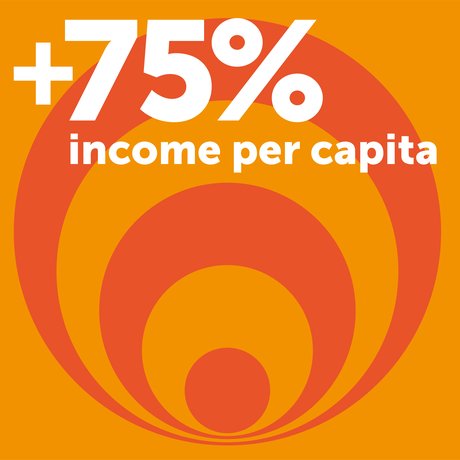Key message
Key challenges
- The cost of not providing education is staggering. Limited educational opportunities and barriers for girls cost the world economy between US$15 trillion and US$30 trillion. In nine countries, the cost of out-of-school children was estimated to be greater than the value of an entire year of GDP growth.
(World Bank, 2018) (Thomas & Burnett, 2013)
Make the case
- Education yields economic gains. Non-formal and informal learning reduce the costs and time required to acquire formal education and vocational programmes yield benefits by helping people learn practical skills that are relevant for the jobs available.
(OECD, 2023) - Early childhood education is a sound investment. Investing US$1 in early childhood education can generate returns as high as US$17 for the most disadvantaged children. In sub-Saharan Africa, every US$1 invested in tripling pre-primary education enrolment can generate up to US$33 in returns.
(Zubairi & Rose, 2013) (Education Commission, 2016) (Copenhagen Consensus Centre, 2016) - Education generates above average financial returns. One US dollar invested in a one-year increase in the average years of schooling attained generates a 10% rate of return in lower-middle-income countries, well above average returns to investment in stocks (4.6%), bank deposits (4.6%), housing (2.8%), and long-term bonds (2.7%).
(Psacharopoulos et al., 2016) - Educating girls and women is one of the most efficient ways to promote economic growth. Increasing the number of women with a secondary education by 1% could increase a country's economic growth by 0.3%.
(Brookings Institution, 2016) - Education has a transformative impact on a country’s economy and future trajectory. Educational attainment explains nearly half the difference in growth rates between East Asia and sub-Saharan Africa over a 45-year period. If Guinea, whose citizens average 3.3 years of education attained, reached Kenya’s average of nine years, its GDP per capita could double.
(UNICEF, 2015) (GEM, 2016) - Education increases income. People with higher levels of education are more likely to find employment, remain employed, learn new skills on the job and earn more over their working life compared to those with lower levels of education.
(OECD, 2023) - Literacy matters. If all young people acquired functional literacy skills within the next 15 years, middle-income countries would achieve economic gains equivalent to more than eight times their current GDP over the next 80 years. In Pakistan, women with strong literacy skills earn 95% more than those with weak literacy skills.
(EFA GMR, 2013) (OECD, 2015) - Increasing enrolment in early childhood education in every low- and middle-income country by 50% would result in an 8-18% return on investment. Early learning programmes can have a return on investment of up to 10:1 for disadvantaged children.
(Engle et al., 2007) (Global Business Coalition for Education, 2016) - Education has a positive impact on GDP per capita. The estimated impacts vary between studies, but the median value is that one additional year of schooling is linked to an 18% increase in GDP per capita.
(UNICEF, 2015) - Quality education leads to positive economic growth for countries. Universal secondary education among young adults aged 15-24 years in low to middle income countries could boost annual gross national income (GNI) by $8.1 trillion, which represents an estimated 11.5% growth.
(Population Council, 2023)
Key infographic

If every child in low-income countries completed secondary school by 2030, income per capita would increase 75% by 2050 and the elimination of poverty would be advanced by 10 years
Key opinion

Kristalina Georgieva
Managing Director of the International Monetary Fund
Building forward better also means seizing the opportunity to achieve greater resilience. This is not just about spending more on schools and distance-learning capacity, but it is also about improving the quality of education and the access to life-long learning and re-skilling. This is how we can navigate the massive structural economic changes that are underway right now. Transitioning from shrinking to expanding industries, such as digital services, poses an enormous challenge that can only be addressed through greater access to educational training opportunities and the digital infrastructure to support them.
Key talking points
- There is a positive association between education and GDP per capita. The estimated impacts vary between studies, but the median value is that one additional year of schooling is linked to an 18% increase in GDP per capita.
- Providing all students with basic cognitive skills can boost economic outcomes, especially in developing countries.
- Universal secondary education among young adults aged 15-24 years in low to middle income countries could boost annual gross national income (GNI) by $8.1 trillion, which represents an estimated 11.5% growth.
Share This Resource
Similar Themes






